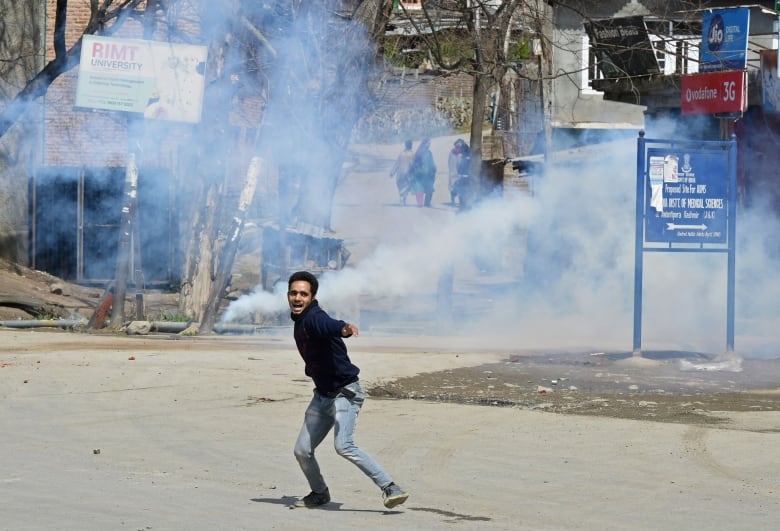'Reduced to ashes': Poet loses life's work after his home is destroyed in war-torn Kashmir
Poet Ghulam Mohammad Bhat is known for his verses about life in the conflict-torn region

Amid the fighting in Indian-controlled Kashmir, Ghulam Mohammad Bhat lost himself in poetry.
But last week, Bhat �— who's also known locally as Madhosh Balhami — was caught up in the middle of a battle. It destroyed his home and his entire life's work.
For almost 30 years, the resident of Balhama, Kashmir, hand-wrote hundreds of pages of verse and has become well-known as a local chronicler of a difficult existence.
As It Happens host Carol Off spoke to local journalist Sameer Yasir, who visited Bhat after the battle and wrote about it for First Post. Here is part of their conversation.
What was Ghulam Mohammad Bhat doing when these armed men broke into his house last week?
He was trying to write a poem about the dowry system in Kashmir Valley, which has been very prevalent for the last couple of years.
He was sitting on the veranda of his house when three militants came firing in the air towards his house, and they asked him if they could go inside.

Did the militants know this was the home of this famous poet in Kashmir?
I'm not sure.
I think they were ambushed a few hundred metres from Mr. Balhami's house, so they were trying to actually go somewhere where they could hide.
Before reaching his house, they had actually fired gunshots in the air. So the first encounter was like the militants told him, "We know you will never forgive us, but for the sake of Imam Hussain, please forgive us."
What were they asking him forgiveness for?
They were asking him for the forgiveness because they knew that they were going to be soon killed in the house and that the house will be destroyed, as has been the precedent for the last few years in Kashmir Valley.
Wherever the militants are, in the last stage when they get caught by the security forces, the houses actually get destroyed.

Did they give him a chance to gather up his things and to leave the house?
I think not, because when I spoke to Mr. Balhami on Friday morning, he said ... they told him that: "We know that you will never forgive us because your house will be destroyed. Nothing will come of it. But for the sake of Imam Hussain, please forgive us. We know we'll be killed soon and your house will be destroyed. Please leave and, if you can, forgive us."
But Mr. Balhami told me that he actually kept his hand on his heart and replied, "I will not keep any ill will against you."
In a few minutes, the security forces would appear and start firing towards the house.
So finally, in three or four minutes, the family abandons the house, leave all their belongings behind. The poet, his daughter, wife, and two sons, soon actually found refuge 200 metres away in a neighbour's house.

He had all this hand-written poetry in his notebooks in the house. Was he able to get any of them with him?
Nothing at all.
On Friday morning, I took Mr. Balhami to his house.
The moment we got inside that house, he was a lost man inside his thoughts. He was thinking about all that he had lost from the past 30, 35 years.
He told me that, "As if every flame was burning the ink on the verses I had [written] over these years. My 30 years of love for poetry and labour was reduced to ashes in minutes."
And he also said a very important line. He said: "But a poet remembers the flames. They are part of his folklore."
What is he saying about his poetry? Will he start again or is he discouraged?
It's such a sad state of affairs. Just one day after his house was destroyed, he actually wrote poetry on it.
The only thing he had left from his house was a pen and a piece of paper on which he had a poem about dowry.
On the second day, when I went again to see Mr. Balhami, he had it in a poem and that poem was about his house — how it was destroyed.
Written by John McGill. Interview produced by Chris Harbord. This Q&A has been edited for length and clarity.